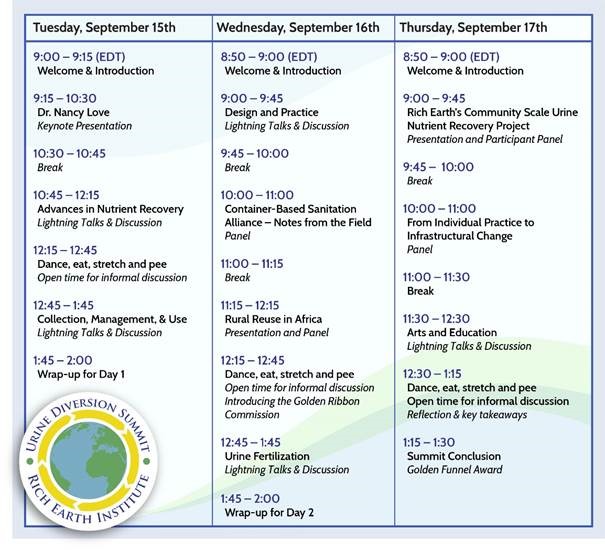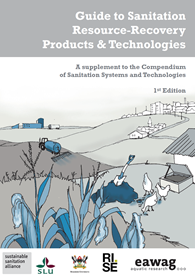Nyligen gjorde Cecilia Lalander och Viktoria Wiklicky från vår forskargrupp en kort 12 minuters video om vår uppfödningskoloni av amerikanska vapenfluglarver. Klicka på länken nedan för att få en virtuell rundtur i våra anläggningar och för att lära dig om hur vi föder upp våra flugor, hur flugorna / larverna rör sig genom de olika stadierna av deras livscykel och hur man behandlar organiskt avfall med BSF-larver.
Webinar om seriöst spelande – RECLAIM
Vi är glada att tillkännage ett webinar om det seriösa spelet som vi har gjort om resursåtervinning inom sanitet – RECLAIM. Vi presenterar den 11 november 2020 mellan kl. 13.00 och 14.00 CEST.

Webinar on serious gaming – RECLAIM
We are pleased to announce a webinar on the serious-game that we have made on resource recovery in sanitation – RECLAIM. We will present it on the 11th November, 2020 between 13:00-14:00 CEST.

2020 Rich Earth Virtual Summit: Återvinna urin som en resurs

En grupp av oss deltog i årets Virtuella toppmöte om återvinning av urin som en resurs. De viktigaste punkterna:
2020 Rich Earth Virtual Summit: Reclaiming Urine as a Resource

A group of us attended this year’s Virtual Summit about Reclaiming Urine as a Resource. The main take aways:
Launching the Guide to Sanitation Resource-Recovery Products & Technologies

We are pleased to announce the we will soon be publishing a Guide to Sanitation Resource-Recovery Products & Technologies! To launch this publication we are hosting a webinar on the SuSanA forum.
When? 22nd of October, 2020 between 14:00-15:00 CEST. Details and registration can be found on this link: https://www.susana.org/en/news-and-events/sanitation-events/upcoming-events?details=170
This Webinar is organized by the Swedish University of Agricultural Sciences (SLU), Makerere University and the Research Institutes of Sweden (RISE) in collaboration with SuSanA working group 5 as part of the SPANS research project. It will present a new publication related to resource recovery from sanitation systems – the Guide to Sanitation Resource-Recovery Products & Technologies. The publication is designed as a supplement to the Eawag Compendium of Sanitation Systems and Technologies. It provides an overview of the possibilities for resource recovery from sanitation and provide guidance on treatment processes to achieve safe products for reuse. The webinar will introduce the guide, including an overview of the technologies and products that are covered in the document, and discuss how the information sheets can be used a reference book for sanitation planning and decision-making.
Guide för resursåtervinning från avlopp – produkter och tekniker

Vi är glada att meddela att vi snart kommer att publicera en guide för återvinningsprodukter och återvinningstekniker från och för avlopp! För att avfyra denna publikation är vi värd för ett webinar på SuSanA-forumet.
När? 22 Oktober, 2020 mellan 14:00-15:00 CEST. Registrering görs via denna länk: https://www.susana.org/en/news-and-events/sanitation-events/upcoming-events?details=170
Detta webinar arrangeras av Sveriges lantbruksuniversitet (SLU), Makerere University och Sveriges forskningsinstitut (RISE) i samarbete med SuSanA-arbetsgrupp 5 som en del av forskningsprojektet SPANS. Det kommer att presenteras en ny publikation relaterad till resursåtervinning från sanitetssystem – Guide för resursåtervinning från avlopp – produkter och tekniker. Publikationen är utformad som ett komplement till Eawag Compendium of Sanitation Systems and Technologies. Den ger en översikt över möjligheterna till resursåtervinning från sanitet och ger vägledning om behandlingsprocesser för att uppnå säkra produkter för återanvändning. Webbinariet kommer att introducera guiden, inklusive en översikt över de tekniker och produkter som omfattas av dokumentet och diskutera hur informationsblad kan användas som referensbok för sanitetsplanering och beslutsfattande.
Doktorand sökes inom urinkoncentrationsteknik
Kretsloppsgruppen vid SLU – Sveriges lantbruksuniversitet söker en doktorand för att förstärka vårt team.
Vi söker en doktorand för vårt forskargrupp om urinkoncentrationsteknik. Doktoranden kommer att fokusera på hållbarhetsbedömningar av teknologierna med ett sociotekniskt perspektiv.
Mer information om tjänsten finns här.
Vacant PhD position working with urine concentrating technologies
The environmental engineering group at SLU – Swedish University of Agricultural Sciences is looking for a PhD student to join our team.
We are looking for a PhD student to join our research team on urine concentrating technologies. The PhD will focus on sustainability assessments of the technologies using a socio-technical perspective. Full details of the position can be found here.
BSF larver som kycklingfoder
I sommar levererade BSF-uppfödningen 40 värphöns med 25 kg levande larver per vecka. Experimentet sträckte sig över 14 veckor och i slutändan hade totalt 350 kg levande larver levererats som näringsrikt kycklingfoder! Hönorna delades upp i tre experimentgrupper, förutom en kontrollgrupp, varvid varje grupp hade olika dieter: Ett standardfoder för höns med en substitution på 10%, 20% och oändlig tillgång av larver gavs för att utvärdera effekten på hönsen. De övervakades regelbundet med veckovisa mätningar av hönsens kroppsvikt, äggproduktion och foderförbrukning. Mängden konsumerade larver uppmättes dagligen och äggkvalitets- och beteendedata samlades också in. Forskarna kommer att använda resultaten av denna studie för att välja den diet som innehåller den högsta substitutionen av protein från soja till BSF-larver samtidigt som de bibehåller lämplig äggproduktion och hönsvälfärd.

